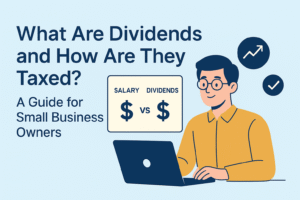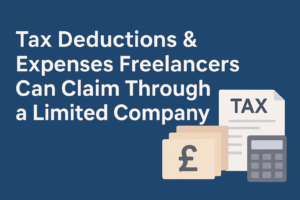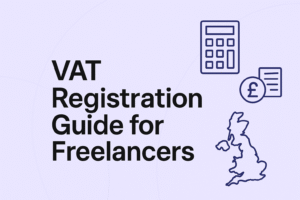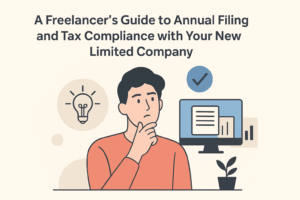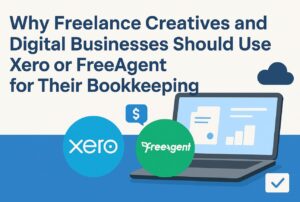
Sole Trader vs Limited Company: Which Structure Works Best for Creative and Digital Businesses?
- Accounting
- Quick Read

Sole Trader vs Limited Company: Which Structure Works Best for Creative and Digital Businesses?
- Recent Thinking
- By Mike Smith
- Last updated on
If you’re a freelance designer, digital marketer, content creator, or small studio owner just starting out (or thinking of formalising your business), one of your first big decisions is: Should I operate as a sole trader or set up a limited company? The answer isn’t one-size-fits-all — but making the right choice early can save you stress, tax, and legal headaches down the line.
In this post, we break down the key differences, the trade‑offs, and what tends to make sense in the creative / digital sector.
Our goal: help you choose the structure that aligns with your risk appetite, growth trajectory, and ambition — without drowning in jargon.
What’s a Sole Trader (Self‑Employed)?
As a sole trader, you run the business yourself. You and the business are legally the same entity.
Pros of being a sole trader:
• It’s simple. Registering as a sole trader with HMRC is quick and (in most cases) free.
• Minimal reporting. You typically just maintain records of your income/expenses and file a self‑assessment tax return annually.
• Full control. Profits belong to you; decisions are yours to make without needing to consult partners or shareholders.
• Privacy. There’s no requirement to publish accounts or company details publicly (beyond what HMRC demands).
Risks / drawbacks:
• Unlimited liability. If your business runs up debts or is sued, your personal assets (home, savings) may be at risk.
• Tax inefficiency at higher profits. Once your earnings grow, you may push into higher tax brackets (and pay more in National Insurance).
• Fewer tax planning tools. You can deduct allowable business expenses, but you won’t have access to corporation tax regimes, dividend planning, or some reliefs reserved for companies.
• Perception limitations. Larger clients or agencies may prefer contracting with a limited company for reliability, insurance, or procurement reasons.
From 6 April 2026, Making Tax Digital (MTD) for Income Tax Self Assessment (ITSA) will become mandatory for many sole traders. That means you’ll need digital accounting software and quarterly updates, not just an annual return.
What’s a Limited Company?
A limited company is a legally distinct entity from its owners (directors/shareholders). That separation brings benefits — and responsibilities.
Advantages of a limited company:
• Limited liability: your personal assets are generally protected if the company faces insolvency or creditors.
• Tax flexibility: the company pays corporation tax on profits. As a director you can take a small salary (subject to PAYE) and then take dividends, which often results in more tax-efficient extraction of profits.
• Access to corporate reliefs and structuring: companies can benefit from certain reliefs, allowances, and retention of profits, which can be used for reinvestment.
• Professional perception: many clients feel more comfortable contracting with limited companies. The “Ltd” suffix often gives legitimacy and helps in landing bigger contracts.
• Scalability & future planning: easier to bring in partners, investors, or expand structure (e.g. subsidiaries) than if you remain a sole trader.
Drawbacks / challenges:
• More admin and regulatory burden: annual accounts, corporation tax returns, statutory filings to Companies House, maintaining shareholder/director registers, and more.
• Higher accounting and compliance costs: many companies need to employ professional accountants to stay on top of obligations.
• Disclosure: company accounts and director information become public (on Companies House).
• Director responsibilities: as a director, you have legal duties (fiduciary, record‑keeping, compliance), and failure to adhere can carry penalties.
Side-by-Side: What Changes in Practice
Factor | Sole Trader | Limited Company |
Liability / Risk | Unlimited | Limited to the company |
Tax / Profit Extraction | Income tax + NI on full profit | Corporation tax + tax on dividends/salary |
Admin & Reporting | Simple | Higher — accounts, tax returns, statutory filing |
Cost / Overhead | Low | Higher (accountants, compliance) |
Client Perception | Personal, flexible | More formal, often preferred by larger clients |
Growth / Scaling | More limited | Easier to scale, bring in shareholders/investment |
When Does a Limited Company Make Sense?
It’s tempting to always opt for simplicity (i.e. sole trader), but there are certain scenarios in your industry context where shifting to a limited company is often a smart move:
1. Profit levels rising — once your net profits climb (e.g. £40,000–£50,000+ before tax), the tax efficiency of a company structure often starts to outweigh its additional cost and complexity.
2. Working with larger clients or agencies — some clients may insist or prefer engaging limited companies (for insurance, liability, procurement or contract reasons).
3. Risk and liability concerns — if your creative work involves contracts, licensing, IP exposures, or taking on debt, limiting your personal liability can provide peace of mind.
4. Planning to reinvest or expand — if you want to grow, hire staff, bring in partners or raise investment, a company structure offers more flexibility.
5. Desire for tax planning options — retaining profits, paying dividends, and accessing reliefs can give more leeway in managing your overall tax burden.
How to Decide (and Tips for Making the Switch)
Here are some guiding questions and tips to help you land on the right structure:
• What are your projected profits?
• How much time / capacity do you have for admin?
• What types of clients do you aim to serve?
• Are you exposed to risk?
• What is your long-term vision?
• Timing your switch matters — many start as sole traders then transition to a company once stable and profitable.
How We Help (and What to Ask Us)
At CORNEL Accountants, we specialise in working with creative, digital, marketing, design, media and tech professionals — so we understand both the numbers and the nuance. Here’s how we support clients making this decision (or transition):
• Structure review & modelling
• Incorporation & transition support
• Ongoing accounting, tax & advisory
• Industry-specific insight
• Peace of mind & clarity
Final Thought
There’s no universal “best” answer — the right structure depends on your profits, risk tolerance, client mix, and growth ambitions. For many creative entrepreneurs, starting as a sole trader offers simplicity and agility. But as the business scales, the advantages of a limited company often become too compelling to ignore.
If you’re standing at this fork in the road, get in touch. We’d be happy to run a no‑obligation structure review, walk you through the implications, and help you choose (or make the switch) with confidence — so your finances support your creativity, not disrupt it.
Gain peace of mind. Free up more time. Pay less tax.
We’re ready when you are.
Credits and thanks: HMRC
How can we help?
👉 Get in touch with us today if you’d like tailored support with annual filing, tax compliance, or managing your small business finances. Our team of accountants are here to help. At CORNEL Accountants we offer our small business clients an all-inclusive and fixed fee basis for any work we do, always agreed up-front. Why not take a look at our typical packages and get in touch for an initial discovery call and explore how we can help you?
Disclaimer:
The content included in this blog post is based on our understanding of tax and company law at the time of publication. It may be subject to change without notice and may not be applicable to your circumstances, so should not be relied upon. You are responsible for complying with tax law and should seek independent advice if you require further information about the content included in this post or guide.




